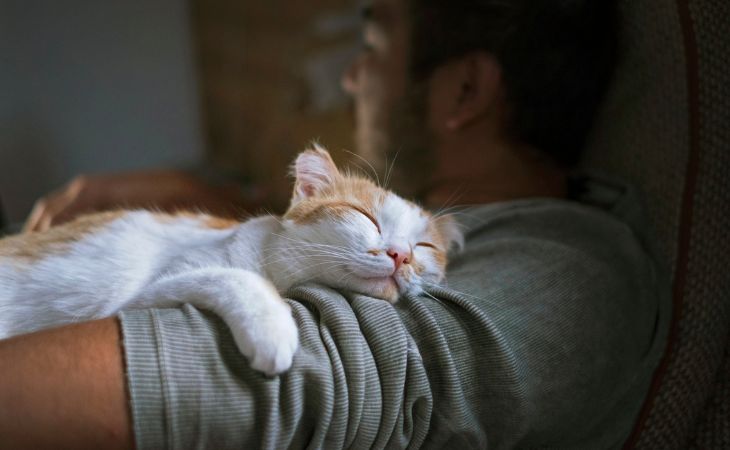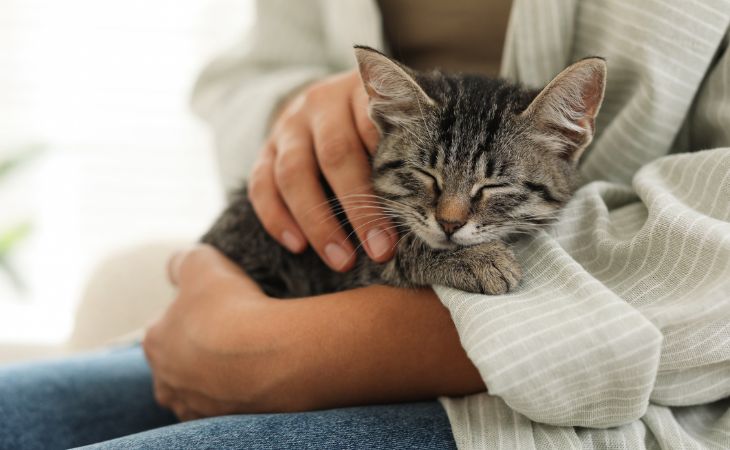Purring is definitely the most iconic sound cats make. It’s soft, soothing, and often mysterious. This sound immediately evokes a feeling of well-being. With that being said, all cat owners have asked themselves at some point: why does my cat purr? Is purring always a sign of happiness? This behavior hides a variety of subtle meanings, both physiological and emotional.
Purring, the cat’s universal language
Purring starts during the the first few days of a kitten’s life. Between the second and third day, they already start purring to communicate with their mother. This sound is used to show their presence when they are suckling and to strengthen their emotional bond with the mother cat. The mother also purrs to reassure and calm her kittens.
This instinctive form of communication never really disappears. As cats grow up, they retain this mode of expression in their interactions with humans and other cats. Purring is a true emotional language, a way for cats to convey their feelings without needing to meow.
How does purring work?
The way purring works remains partly mysterious, even to scientists. It is thought to be produced by vibrations in the vocal cords and muscles of the larynx, triggered by a nerve signal sent from the brain. This creates a rapid alternation of contractions and relaxations, generating the famous rhythmic sound between 25 and 150 hertz.
Some studies have shown that these frequencies may have therapeutic effects, particularly in promoting bone healing and relieving stress. Therefore, purring is not only a means of communication: it is also an internal regulatory mechanism that contributes to a cat’s well-being.
A sign of well-being and contentment
The most known reason for purring is, of course, happiness and pleasure. When a cat rubs against you, settles down on your lap, and closes their eyes while purring, this is clearly expressing a feeling of safety and attachment.
This behavior often occurs in calm and pleasant contexts: a cuddle session, a relaxing moment, or even just being in the presence of their favorite human. They feel good, relaxed, and protected. Purring then becomes a reflection of a state of emotional fulfillment.
Cats purr to soothe themselves or relax
However, purring does not always mean that the cat is happy. Some cats purr in situations of stress, pain, or anxiety. This may come as a surprise, but it is a self-soothing mechanism for them.
A cat visiting the vet, recovering from an injury, or experiencing a change in its environment may start purring to calm itself down. This behavior acts a bit like deep breathing in humans: it helps the cat relax and regain emotional balance.
Some vets even refer to therapeutic purring, which allows cats to release endorphins to better manage pain or anxiety.

Purring, a tool for communicating with humans
Cats have also learned to adapt their purring to their relationship with humans. For instance, researchers have observed that some cats emit a “soliciting” purr, which is slightly different from the classic purr. This purr contains a higher-pitched modulation, similar to a baby’s cry, and is able to attract the owner’s attention.
This type of purring often happens at mealtimes or when a cat wants attention. It is a subtle communication strategy that was developed to influence human behavior towards them. Basically, your cat knows very well that their purring softens your heart. They can use this to their advantage.
Cats purr in difficult moments
Some cats purr when they are sick, injured, or even at the end of their lives. This behavior could be an attempt to soothe themselves, both physically and emotionally.
The vibrations of purring promote blood circulation, reduce blood pressure, and help the body regenerate. Cats purr to relieve pain or maintain their inner balance.
Because of this, purring should not always be interpreted as a sign of well-being. The context (such as posture, gaze, appetite, general behavior) is also important to understanding what your cat is really communicating with their purrs.
Why does my cat purr when I pet them?
When you pet your cat and they purr softly, it is a sign of bonding and trust. This physical contact stimulates the production of oxytocin, the happiness hormone, in both animals and humans. This shared moment can strengthen your emotional bond and provide the both of you with a feeling of relaxation.
However, cats sometimes purr while showing signs of annoyance, such as moving their tails or flattening their ears. In this case, purring is not a sign of pleasure, but rather an attempt to calm themselves down when faced with overly intense stimulation.
This Letsgetpet article might interest you: How to pet a cat properly
Purring and its benefits for humans
The soothing power of purring isn’t just beneficial to cats. This sound can also have a positive effect on us. For example, several studies have shown that when a cat purrs, it reduces stress, lowers blood pressure, and promotes relaxation. This phenomenon is sometimes referred to as “purr therapy.”
The low frequencies of purring have a similar effect to meditation or relaxation sessions. For example, they encourage the release of serotonin and provide a feeling of serenity and peace. Living with a cat that purrs regularly can therefore really contribute to your emotional and physical well-being.
F.A.Q. – Everything you need to know about why cats purr
My cat purrs all the time. Is that normal?
Yes, if their general behavior remains normal: appetite, activity, and relaxed attitude. Some cats are simply more expressive than others. However, if the purring is accompanied by signs of pain or fatigue, it is best to consult a veterinarian.
Why doesn’t my cat purr?
Not all cats purr audibly. Some cats purr very softly, while others do not purr at all. If a cat never purrs, it does not mean they are unhappy. Instead, their means of communication may simply be different.
Can purring help heal my cat?
Not strictly speaking. However, it can promote relaxation, relieve pain, and accelerate healing thanks to the vibrations it produces.
Do cats purr when they are scared?
Yes, it’s possible for cats to purr when they are scared. Purring can be used to reassure themselves when in a stressful situation, just as it can accompany a state of well-being.
Purring is its own language. It’s both complex and fascinating. While purring often expresses happiness and relaxation, a cat can also purr to calm fear, pain, or stress. If you are able to better understand the nuances of this behavior, you’ll be able to better decode your cat’s emotions and strengthening your bond.

